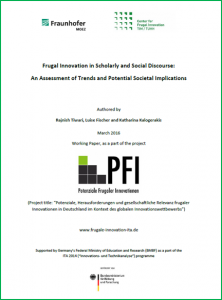 As a part of our joint BMBF-ITA project with Fraunhofer Center for International Management and Knowledge Economy (MOEZ) in Leipzig we have published a new paper to assess trends and potential societal implications of frugal innovation by analyszing scholarly and social discourse.Apart from this the paper also reports results of our workshop held in Hamburg on January 12, 2016 to assess the potentials of frugal innovation in the specific context of Germany. The publication details are as follows:
As a part of our joint BMBF-ITA project with Fraunhofer Center for International Management and Knowledge Economy (MOEZ) in Leipzig we have published a new paper to assess trends and potential societal implications of frugal innovation by analyszing scholarly and social discourse.Apart from this the paper also reports results of our workshop held in Hamburg on January 12, 2016 to assess the potentials of frugal innovation in the specific context of Germany. The publication details are as follows:
Authored by: Rajnish Tiwari a, Luise Fischer b and Katharina Kalogerakis a
a Center for Frugal Innovation, Institute for Technology and Innovation Management, Hamburg University of Technology (TUHH), Hamburg, Germany
b Fraunhofer Center for International Management and Knowledge Economy (MOEZ), Leipzig, Germany
Abstract
The topic of frugal innovation is increasingly gaining relevance in social as well as scholarly discourse. Frugal innovations have been perceived by many to be a phenomenon generally confined to emerging economies where there are large groups of unserved consumers with unmet needs. But there is increasing evidence that this phenomenon is getting relevant also in the industrialized nations potentially affecting the long-term competitiveness of domestic firms not only overseas but also at home.
